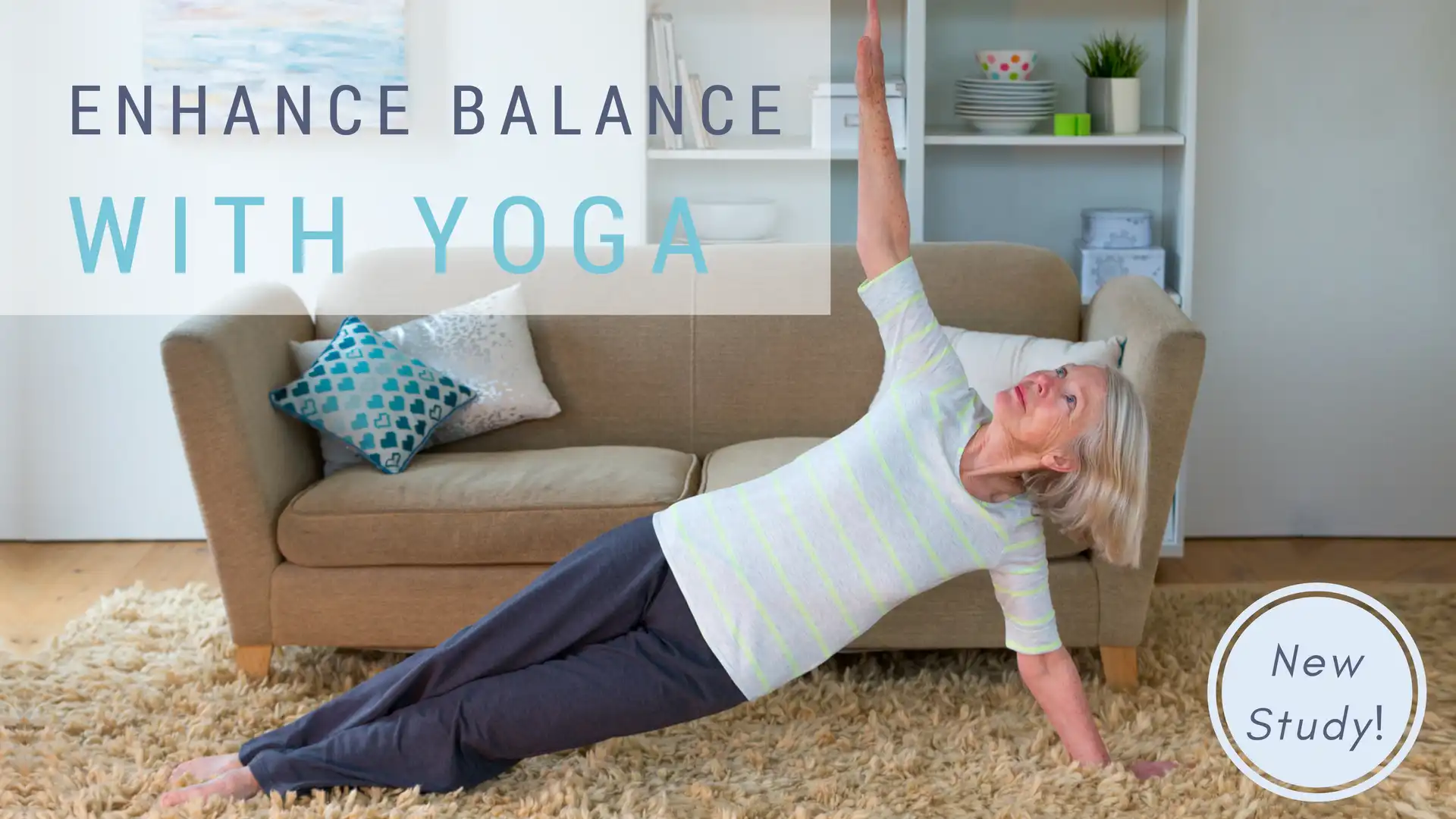Yoga Poses Improves Both Balance and Cognitive Perfomance, Study Suggests

The loss of balance control presents a major risk for falls and fractures for aging adults. Poor balance control can be attributed to a loss of core strength and muscle mass. A decline in neuromuscular integration, the brain’s ability to perform multiple tasks at the same, is also believed to significantly contribute to poor balance and increased fall risk. A study suggests that yoga might enhance balance control by increasing the brain’s ability to perform multiple tasks at the same time.
Most daily activities require us to think and act simultaneously. When it comes to balance control, this means that we use our brain’s cognitive and motor networks at the same time – a phenomenon called dual tasking.
Dual tasking increases the risk for errors like not paying attention or falling. A new study published in Complementary Therapies in Medicine finds that yoga may increase our capacity to dual task safely.
In the study, 10 yoga practitioners were compared to non-practitioners of approximately the same age (mean age 27.5 years, sd=9.33 and 26.7 years, sd 6.48 respectively), gender (2 male, 8 female), height and weight. Yoga group members were required to have practiced Hatha or Kundalini yoga 2-3 times per week for 45 minutes to an hour for at least a year or more.
Individuals from both groups were brought to the University of Illinois for an 80-minute session during which they completed a series of motor tasks designed to test postural stability, balance control, reaction time, and sensory integration. They were then requested to count backwards, and perform a test of executive function, which involved subtracting 8 from 96 as quickly as possible.
To explore whether dual tasking reduced motor performance, participants where then asked to perform the motor and executive function tests simultaneously while standing on a platform that shifted under their feet
Yoga Improves Dual Tasking Performance
Dual tasking comes at a cost. This cost can take the form of impaired balance control, as well as reduced memory, attention, problem solving, and ability to perform complex tasks.
Results of the study showed that this cost is less for yoga practitioners compared to controls. Individuals in the yoga group demonstrated better overall balance control than non-yoga participants when faced with a cognitive challenge. What’s more, yoga group members demonstrated faster reaction times during the intentional balance control test.
Yoga participants also performed better on tests of cognitive abilities during the balance challenge than non-yoga controls. This may be because yoga practitioners routinely engage in postures that develop balance control skills while concurrently challenging executive function capacities such as attention, and concentration.
Another important capacity that may be attained through regular yoga practice is the ability for the postural control system to attend to salient cues and ignore unnecessary ones. For example, when walking on a sandy beach, visual cues that assist in balance may be “weighted” more heavily by the brain than sensory inputs received by the feet on an uneven surface. As such, yoga practitioners may be more selective in their ability to attend to what matters to maintain balance, rather than weighting poor sensory cues heavily.
An additional potential explanation may be that yoga practitioners are better able to manage stress-related anxiety. Anxiety is known to impede cognitive efficiency. The less anxious an individual during a balance control task, the more she may be able to negotiate dual task situations effectively.
Unfortunately, at this point, these conclusions are largely speculative as this study was conducted on a very small sample, and details regarding participant’s yoga histories or the physical activities of the control group are unknown. Because this research is retrospective, it is impossible to ascertain whether the benefits observed were be specifically attributable to yoga practice, or some other factor. Future studies will be needed to better understand these relationships.
Also, read...
Yoga for Osteoporosis: How Your Breathing Affects Your Bones
Study Finds that Yoga, Meditation Can Reduce Health-Care Utilization
How Exercise Might Help Brain and Nervous System Health
Related courses
Breath as Medicine: Yogic Breathing for Vital Aging
Yoga and Myofascial Release: Releasing Chronic Tension with the Bodymind Ballwork Method

Dr. B Grace Bullock is a behavioral health, education, and organizational strategist and policy advisor, psychologist, educator, research scientist, book author and science writer. She serves as the Director of Mental and Behavioral Health for the Oregon Department of Education.
Grace has dedicated her career to health promotion, prevention, intervention, research, and developing policies, programs, and practices that ensure that all children and families have equitable access to culturally responsive mental health services and educational supports. She champions the creation of safe, welcoming, and inclusive school systems, cultures, and climates that honor diversity and intersectionality, fully recognize all ways of being and knowing, and ensure that all belong. This means working in partnership to realize detailed, actionable policies that drive sustainable systems to change.
Dr. Bullock strives to be a trusted partner, bringing the values and principles of mind-body medicine into strategic planning, education, and health policy, and program design, development, training, and the evaluation/research of offerings and policies that promote personal, interpersonal, and systemic well-being, effective and equitable leadership, decision-making and social change.
An educator at heart, she teaches courses and workshops on strengths-based, trauma-informed, equity-centered principles and practices, interpersonal relationships, stress resilience, and clinical practice at colleges, universities, professional schools, school districts, and organizations across the USA and Canada. She has spent more than two decades teaching and studying physiological and psychological interventions to reduce stress and support resilient, healthy relationships and systems, and is the author of the acclaimed book, Mindful Relationships: 7 Skills for Success – Integrating the science of mind, body & brain. Her research has been published in numerous empirical journals and featured in Psychology Today and The Greater Good Science Center, among others. She is the science writer for Mindful Magazine and Mindful.org and former Editor in Chief of the International Journal of Yoga Therapy.
She received a BA Highest Honors in Psychology, Summa Cum Laude from the University of California at Los Angeles, an MS and Ph.D. in Clinical Psychology from the University of Oregon, and completed her clinical residency at the University of Washington School of Medicine.
- Subramaniam, S & Bhatt, T. (2016). Effect of yoga practice on reducing cognitive-motor interference for improving dynamic balance control in healthy adults. Complementary Therapies in Medicine, 30, 30-35.



